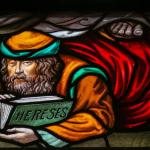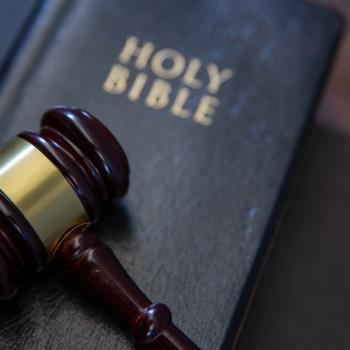It is, or at least should be, a grave responsibility for every pastor, teacher and preacher of the Bible to not just be aware of heresies but to actively defend the apostolic and orthodox Christian faith against them. Unfortunately, one of the most lamentable realities in American Evangelicalism today is a woeful ignorance of Church History, especially early Church history. This causes a problem, for it was early in the life of the Church that God’s people encountered two essential types of Christian heresy: two heresies that continue today.
Thus, while we may be able to recognize heresy when we see it, to be ignorant of early Church history is often to be unaware of the origin and nature of the principle errors people make about the one true and orthodox faith of Jesus Christ. This can, in turn, leave us unprepared to defend the faith, since heresies often go by different names and take on different forms as culture changes (e.g., Arianism and Jehovah’s Witness). Nevertheless, the essence of a heresy never alters or shifts; the core elements always remain the same. Just as eternal truths can be articulated in new ways for a each generation, so too can perennial lies.
Heresies and Heresy Hunting
However, what our ignorance of history often leads to is not necessarily the downplaying that heresy exists (although it does that as well). Rather, it tends to lead to a hyperactivity about heresy, a “heresy hunting” mindset where heresy is found under every rock and in every pulpit. This overreaction has unfortunate consequences. For just as it is with calling everyone you disagree with “Hitler” or “Nazi,” to call everything your particular church disagrees with “heretical” just enables real heresies to go unchecked. If everything is heretical, then nothing is heresy.
And so to avoid two errors: 1) the error of calling that which is not heretical “heretical,” and 2) of ignoring or failing to discern that which is genuinely heretical, we must first understand the essence of a particular heresy. To do this we need to examine two forms of aberrant belief that entered into God’s Church almost from the start. We must know and understand these two greatest heresies of the Church in particular, for they really are false beliefs about the Gospel that never go away but which are merely repackaged from generation to generation.
Heresy #1: Judaizing and the Return to the Law
The first great heresy is one which starts before the canon of the New Testament is even complete. It is the heresy of the Judaizers. We know that this heresy started early, because it is addressed in the Scriptures themselves. In Paul’s letter to the church in Galatia, he mentions an incident that occurred between him and the apostle Peter in Antioch. The passage needs to be cited in full:
11 When Cephas came to Antioch, I opposed him to his face, because he stood condemned. 12 For before certain men came from James, he used to eat with the Gentiles. But when they arrived, he began to draw back and separate himself from the Gentiles because he was afraid of those who belonged to the circumcision group. 13 The other Jews joined him in his hypocrisy, so that by their hypocrisy even Barnabas was led astray.
14 When I saw that they were not acting in line with the truth of the gospel, I said to Cephas in front of them all, “You are a Jew, yet you live like a Gentile and not like a Jew. How is it, then, that you force Gentiles to follow Jewish customs?
15 “We who are Jews by birth and not sinful Gentiles 16 know that a person is not justified by the works of the law, but by faith in Jesus Christ. So we, too, have put our faith in Christ Jesus that we may be justified by faith in[d] Christ and not by the works of the law, because by the works of the law no one will be justified.
17 “But if, in seeking to be justified in Christ, we Jews find ourselves also among the sinners, doesn’t that mean that Christ promotes sin? Absolutely not! 18 If I rebuild what I destroyed, then I really would be a lawbreaker.
19 “For through the law I died to the law so that I might live for God. 20 I have been crucified with Christ and I no longer live, but Christ lives in me. The life I now live in the body, I live by faith in the Son of God, who loved me and gave himself for me. 21 I do not set aside the grace of God, for if righteousness could be gained through the law, Christ died for nothing!”
Galatians 2:11-19
Without conducting an exhaustive exegesis, the essence of the passage revolves around Peter giving into a group of Jews that, on the one hand, want to proclaim Christ as the Messiah but, on the other, want to argue that Christ’s death and resurrection have not made atonement for sin. As such, these “Judaizers” believe that for anyone to become a Christian, they must first become a Jew, not only in their external practices but in the fullest, soteriological sense. In short, to be saved from God’s wrath upon sin, one still had to maintain the full extent of the Mosaic law, and this in spite of what Christ had done on behalf of sinners.
One of the earliest sects of Judaizers were the Ebionites, who Irenaeus addressed as an heretical group in his famous treatises Against Heresies:
Those who are called Ebionites agree that the world was made by God; but their opinions with respect to the Lord are similar to those of Cerinthus and Carpocrates. They use the Gospel according to Matthew only, and repudiate the Apostle Paul, maintaining that he was an apostate from the law. As to the prophetical writings, they endeavour to expound them in a somewhat singular manner: they practise circumcision, persevere in the observance of those customs which are enjoined by the law, and are so Judaic in their style of life, that they even adore Jerusalem as if it were the house of God.
Irenaeus, AH.XXVI.2
The Essence of The Judaizing Heresy
What is the essential nature of this heresy? In other words, what basic principle of the true Gospel is rejected by the Judaizers and their successors? The answer is twofold: the rejection of God’s grace on account of human pride. For the person disposed toward Judaizing, it cannot be the case that God would substitute Himself for the sake of the sinner. It is unacceptable to the Judaizing heart that God would pay the price for sin and then offer us freedom if we only have faith in what He has done.
The Judaizer, in his pride, simply cannot stomach this kind of love. Consequently, he apostatizes from the truth of the Gospel by demanding that he alone get to atone for his sins. And so the Judaizer, whether it be ancient Ebionites, later Pelagians, medieval Socinians, or contemporary legalists, always try to put themselves (and others) back under the law of Moses. For these, the good news of the Gospel is simply too good to be true.
This heresy, however, not only places a burden back onto mankind’s shoulders, one that God Himself has relieved, it thumbs its spiritual nose at the cross of Christ. The Judaizer’s attitude toward the love of God can be summed up most simply as: “Hey God, thanks, but no thanks!”
It is also worth noting that like the next heresy we will look at, which is the absolute counter-part to the Judaizing heresy, Judaizers severely limited their canon of Scripture. Those apostolic writings, especially of Paul, that did not conform to their preconceived notion of salvation by works, had to be discarded from their communities. Paul, for the Judaizers, was a particularly annoying preacher of “bad” news.

One side note at this point: the heresy of Judaizing should not be confused with contemporary movements like “messianic” Judaism. Messianic Judaism does not seek to reinstate the Mosaic Law as such, even if it looks to preserve the Jewish roots of Christianity, the unity of both testaments, Jesus’ Jewishness and the ethnic traditions of Jews. For more on Messianic Judaism, watch here.
A Literary Example of Juadizing
In his masterpiece on the nature of heaven and hell, The Great Divorce, C.S. Lewis captures the psychological aspect of the Judaizing heresy in the character of the “Big Ghost.” Again, Judaizing has nothing to do with being ethnically “Jewish.” Gentiles can be Judaizers. When confronted in heaven by a former employee of his business, a man who in life had been a murderer, the Big Ghost points to his own efforts as the basis to get what he is owed, to get his “rights:”
“Look at me, now,’ said the Ghost, slapping its chest (but the slap made no noise). ‘I gone straight all my life. I don’t say I was a religious man and I don’t say I had no faults, far from it. But I done my best all my life, see? I done my best by everyone, that’s the sort of chap I was. I never asked for anything that wasn’t mine by rights. If I wanted a drink I paid for it and if I took my wages I done my job, see? That’s the sort I was and I don’t care who knows it.”
The former murderer. “Len,” who is now a saint in heaven, tries to explain to the Big Ghost that this just isn’t how things work in God’s kingdom:
“[Len] ‘Oh no. It’s not so bad as that. I haven’t got my rights, or I should not be here. You will not get yours either. You’ll get something far better. Never fear.’
[Big Ghost] ‘That’s just what I say. I haven’t got my rights. I always done my best and I never done nothing wrong. And what I don’t see is why I should be put below a bloody murderer like you.’
[Len] ‘Who knows whether you will be? Only be happy and come with me.’
[Big Ghost] ‘What do you keep on arguing for? I’m only telling you the sort of chap I am. I only want my rights. I’m not asking for anybody’s bleeding charity.”
[Len] ‘Then do. At once. Ask for the Bleeding Charity. Everything is here for the asking and nothing can be bought.’
The Big Ghost winds up returning to Hell instead of accepting the offer of Heaven. His problem, he cannot accept getting something he isn’t owed. And this is the essence of all Judaizing heresies, regardless of what name they go by. The form that the Judaizing heresy takes is inevitably moralistic and legalistic, making little to no room for grace, and emphasizing man in his own strength and goodness. But, if God has seen it fit to relieve man of the Law, then the proper response is gratitude, not to try and reinstate the Law and live under it all over again. As Paul says, to do so would be to treat Christ’s death as “for nothing.” It is only when we give up our right to be owed anything by God that we can avoid falling into this damnable error.
In the next post, I will discuss the near opposite heresy of Judaizing. This other heresy is more prevalent in contemporary American Evangelicalism today, and much more subtle. However, it is no less destructive.














